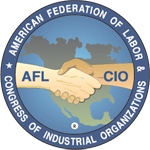On May 23, AFL-CIO President Richard Trumka released a statement on how President Trump’s FY2018 budget proposal favors the top one percent and h
Tag: AFL-CIO Transportation Trades Department
[As published By John Previsich And Edward Wytkind in The Modesto Bee]

California has more museums dedicated to railroads than any other state in our country – and it’s easy to see why. From the transcontinental railroad to the developing high-speed rail system, rail transportation has played a significant role in shaping this state’s history.
The people of California believe passenger rail is key to the state’s future, too. At a public hearing in Modesto last summer, plans to improve and expand passenger rail service received overwhelming support from area residents, Republicans and Democrats alike. And a new poll prepared by Dean Mitchell of DFM Research found those same sentiments are shared by the people of California’s 10th Congressional District.
Those living in the district enjoy six daily Amtrak train routes in the San Joaquin Valley, running from Bakersfield to Sacramento and the Bay Area. More than 8 of 10 polled say they want to see Amtrak service increased or at least remain the same, and more than 80 percent want commuter rail services increased or maintained at current levels.
Modesto-area residents aren’t alone. As Amtrak continues to grow in popularity – ridership hit an all-time high in 2014 with 31 million passengers – an overwhelming majority of Americans support increasing passenger rail service in all parts of the country, both in traditionally blue and red states from the south to the Midwest and Northeast.

Sadly, not everyone is hearing this call.
Some in Congress continue to fight the old anti-Amtrak wars by proposing the elimination of all federal funding to support the service, which would bankrupt the railroad and strand riders in California and across America. While those efforts have failed, the persistence of anti-passenger rail forces has brought headwinds to efforts to advance a robust passenger rail expansion and modernization plan.
Like the vast majority of Americans, most residents of Stanislaus County and the surrounding areas have shown they don’t agree with such proposals. In fact, when told that Amtrak gets over $1 billion per year in federal support, more than 80 percent say they reject attempts to eliminate it and want to continue the current funding level.
In addition to expanded passenger rail service, Californians also say emphatically that they favor policies making rail transportation safer.
Not unlike the views of most Americans, the idea of running 19,000-ton freight trains – many containing hazardous materials – with only one crew member doesn’t sit well with the people of the 10th Congressional District. With up to 50 freight trains running through the region each day, a stunning 95 percent of residents support a state law requiring a minimum of two crew members on all freight trains running through California – such as the one signed into law in September by Gov. Jerry Brown.
More than 90 percent of those surveyed want national legislation mandating the same thing. This issue impacts passenger rail safety as well, because in most parts of the country Amtrak shares the tracks with freight trains.
Californians understand that having a safe, efficient rail system is vital to a strong economy. We need actions that can bring relief to a clogged transportation system that is choking productivity, stunting job creation and undermining efforts to grow our economy. California voters couldn’t be more clear: they like passenger rail service, they want more of it and they expect their elected officials to make it as safe as possible.

“The need for long-term investments in our transportation system and infrastructure will not ‘just go away,’” said Edward Wytkind, president of TTD, who added that the dialogue with congressional guests “focused like a laser” on ending the stalemate on crucial investment bills. “With the recent progress on a surface transportation bill and strong bipartisan display of support for the U.S. Merchant Marine, we may be witnessing a brief but important timeout from senseless partisanship.”
TTD hosted roundtable discussions with Rep. Peter DeFazio (D-OR), the ranking Democrat on the Transportation and Infrastructure Committee, Senator Bill Nelson (D-FL), the ranking Democrat on the Senate Commerce Committee, and Rep. Mario Diaz-Balart (R-FL), chairman of the Transportation, Housing and Urban Development Appropriations Subcommittee.
The high priorities during the discussion with lawmakers included keeping aviation and maritime issues out of the Transatlantic Trade and Investment Partnership (TTIP); fighting legislative assaults on longshore employees’ bargaining rights; passing Transportation Security Administration (TSA) reauthorization; boosting the Maritime Security Program; and rejecting emerging hair specimen drug testing legislation.
“As Chairman of the Transportation Appropriations Subcommittee, I value input from my friends in the transportation labor community who bring a critically needed front-line employee perspective to our work,” Diaz-Balart said. “By seeking the views of both labor and business, community leaders and other important partners, we can develop real, long-term solutions to our nation’s transportation infrastructure challenges.”
“We need to increase investments in our infrastructure and focus on the areas that will truly help create jobs and support our economy,” Nelson said. “We also need to protect the men and women who are out there every day making our transportation systems work.”
“Transportation infrastructure is at the heart of the U.S. economy. Our economic competitiveness, our businesses and millions of American jobs depend on robust investments in our crumbling network of roads, bridges, highways and transit systems,” DeFazio said. “We must continue to push for legislation that will modernize our nation’s transportation infrastructure, create good jobs and enhance the rights and working conditions of the men and women who keep America moving. I thank TTD for joining in that effort.”
The Executive Committee also held a discussion about plans for member education in the 2016 presidential election.
TTD, which represents some 2 million workers in every sector of transportation, has been working with its affiliates on a flurry of key issues. Just today TTD and its maritime and aviation affiliates sent a letter to President Obama urging his Administration to keep maritime and aviation out of any TTIP negotiations. TTD has aggressively countered the trucking lobby’s agenda to bring “unscientific” hair specimen drug testing to front line bus and truck drivers. And TTD coordinated efforts with its member unions to advance a surface transportation bill out of committee last week that awaits House floor consideration.
“When you’re talking about transportation jobs, you’re talking about middle-class jobs — the types of jobs that elude too many Americans,” Wytkind added. “The policies that affect our sector have a real impact on working families, and that’s something Congress can’t forget despite working in the Washington bubble.”

WASHINGTON — In a letter to the leadership of the Transportation and Infrastructure Committee, the Transportation Trades Department, AFL-CIO (TTD), together with member unions and coalition partners, is urging lawmakers to follow established protocol for developing federal drug testing procedures and exclude provisions for hair specimen testing from any House surface transportation bill.
Historically, experts at the Department of Health and Human Services (HHS) have determined how and when new drug testing procedures should be administered. Those guidelines are then used by the Department of Transportation (DOT) to create federal drug testing standards for bus and truck drivers, and other transportation employees.
HHS has not determined whether hair is a valid and reliable specimen for use in federal drug tests and has not issued technical guidelines permitting its use. Despite this, a provision in the Senate’s version of the surface transportation bill would circumvent HHS and allow bus and truck companies to use hair samples to comply with DOT drug testing.
“The Senate has undermined the expertise of scientists and potentially jeopardized the jobs of thousands of bus and truck drivers with this unproven testing method,” said TTD President Edward Wytkind. “We urge the House to reject the Senate’s hair testing provision and ensure that federal drug tests are backed by scientific and forensically sound evidence. Nothing less should be acceptable.”
Studies show that hair testing may have an inherent racial bias. Darker and more porous hair retains some drugs at greater rates than lighter hair. Hair specimen can also cause individuals to test positive for drugs they never ingested, as drugs from the environment can absorb into hair and cause positive results.
“The science behind hair testing is questionable and the drug test results it produces may be discriminatory and could produce false positives,” Wytkind warned.
The following organizations joined TTD on the letter:
American Civil Liberties Union
Association of Flight Attendants-CWA
Air Line Pilots Association
American Medical Review Officers, LLC
American Train Dispatchers Association
Amalgamated Transit Union
Brotherhood of Railroad Signalmen
International Association of Machinists and Aerospace Workers
International Brotherhood of Teamsters
Jewish Alliance for Law and Social Action
Lawyers’ Committee for Civil Rights and Economic Justice
National Air Traffic Controllers Association
National Workrights Institute
Sheet Metal, Air, Rail and Transportation Workers-Transportation Division
Sailors’ Union of the Pacific
Transport Workers Union of America
United Steelworkers
Washington, DC — Edward Wytkind, president of the Transportation Trades Department, AFL-CIO (TTD), issued this statement on the Comprehensive Transportation and Consumer Protection Act of 2015, introduced by Sen. John Thune (R – S.D.):

Wytkind
“At a time when our country’s transportation infrastructure is failing and disenfranchised Americans are desperate for work, bipartisan support is crucial to fund our nation’s highway and transit systems, and boost job creation.
“Instead of following a bipartisan model — as Senators James Inhofe (R-OK) and Barbara Boxer (D-CA) of the EPW Committee demonstrated last month — Commerce Committee Republicans are unwisely using their section of the surface transportation reauthorization bill to advance a partisan agenda that harms workers.
“The Thune bill includes a poorly veiled measure designed to blame workers and their unions for all port delays during a bargaining dispute. It also prematurely allows the use of hair specimens for drug testing of bus and truck drivers. These provisions have no place in any portion of the surface transportation reauthorization bill.
“Sen. Thune’s bill also fails to require rail carriers to provide emergency responders with information about the amount and type of hazardous materials moving through their localities — a commonsense measure that is critical to the efforts of first responders to save lives.
“The highway/transit reauthorization bill is one of the most important initiatives Congress will consider this year. Senate Commerce Committee Republicans must stop playing partisan politics with this already long-delayed transportation investment bill, and reject proposals that undermine the rights of employees and fail to support our transportation system.”

Wytkind
Washington, DC — Edward Wytkind, president of the Transportation Trades Department, AFL-CIO (TTD), issues this statement on the consideration of the Amtrak Reauthorization bill:
“We applaud Senators Roger Wicker and Cory Booker for working in a bipartisan fashion to craft a sensible Amtrak Reauthorization bill that will be considered by the Commerce Committee today. The bill proposed by Wicker and Booker provides Amtrak with higher funding levels than the bill passed by the House, and includes reforms to the rail financing program that meet pressing needs to replace 100-year-old rail tunnels and other major infrastructure projects.
“While we strongly support these provisions, we remain concerned that the Wicker-Booker bill allows entities other than Amtrak to bid on service without full assurances that these rail operators will be covered by the same rail labor laws Amtrak follows today. If entities other than Amtrak are going to compete for business in the intercity passenger rail sector, then they should be required to comply with the same rail labor statutes and not be permitted to gain a competitive advantage at the expense of rail employees.
“While we are pleased that the bill contains provisions to bolster rail safety, we believe this legislation misses the chance to advance a number of common sense reforms that will make rail transportation safer. We also reject efforts to use this bill to mandate inward-facing cameras without basic privacy and anti-harassment protections for workers who spend up to 70 hours a week in locomotive cabs.
“We look forward to working with Senators Wicker and Booker to address these shortcomings and to craft a final bill that ensures our nation’s passenger rail system receives the funding and support needed to make it an engine for good jobs, mobility and strong economic growth.”
Transportation union leaders vowed to “redouble their efforts” to push for bipartisan solutions to the growing transportation infrastructure investment crisis that is undermining the economy and idling millions of jobs, said AFL-CIO Transportation Trades Department President Edward Wytkind following the 2014 Fall TTD Executive Committee meeting Nov. 13.
“We had an important conversation today about how the midterm elections will impact our members in 2015,” Wytkind said. “We focused on how we can change the tone and content of the senseless debates in Washington about the bread and butter economic issues that have gone unaddressed for too long. We also vowed to stop current and newly elected members of Congress who think they’re being sent to Washington to eviscerate workers’ rights and abdicate the federal government’s responsibility as the chief steward of our transportation system.”
SMART Transportation Division President John Previsich and SMART Transportation Division National Legislative Director John Risch were in attendance.
Sen. Tom Carper (D-Del.) joined the meeting to collaborate with transportation unions on strategies to end the gridlock on vital transportation funding legislation. Specifically, Carper emphasized the need to stop “kicking the can” on a long-term fix to the insolvency faced by the Highway Trust Fund, which is the centerpiece of transit, highway, and bridge investments.
“I am committed to working with TTD affiliates, as well as a broad coalition of businesses, labor, truckers, motorists, transit riders, and elected officials, to ensure Congress does its job to pass and fund a long-term transportation bill. Without long-term funding certainty, our cities and states have put projects on hold that would repair our aging infrastructure and grow our economy,” Carper told transportation union leaders.
“Passing a fully-funded surface transportation bill is my top priority in the lame duck session, but Congress also must not lose sight of other critical infrastructure responsibilities in the rail, aviation, and port-maritime sectors. I believe that the chorus of voices supporting this initiative will be heard and Congress will do the right thing.”
Two senior officials of the Obama administration also joined the meeting to discuss the president’s goal to boost investments in and modernize our transportation system.
Byron Auguste, deputy director of the National Economic Council, and Peter Rogoff, undersecretary of transportation for policy at the U.S. Department of Transportation, joined the Executive Committee to discuss strategies to unify Democrats, Republicans, and Independents around a bipartisan solution to our severe infrastructure investment deficit and to emphasize the importance of such a solution to the administration in 2015.